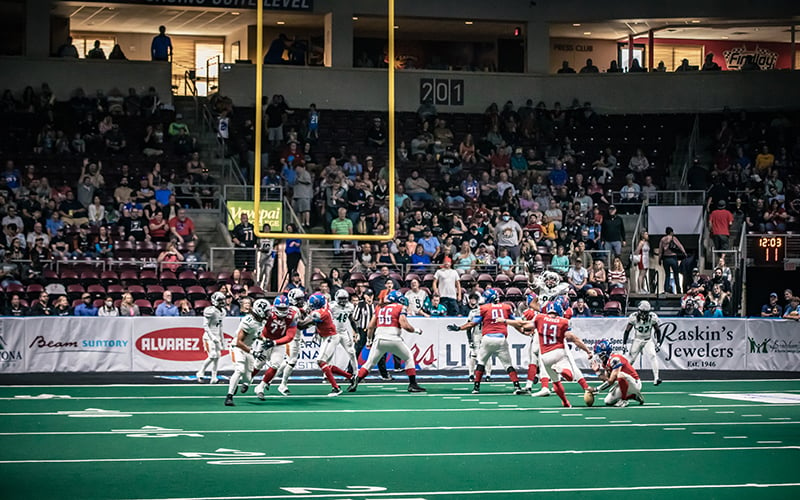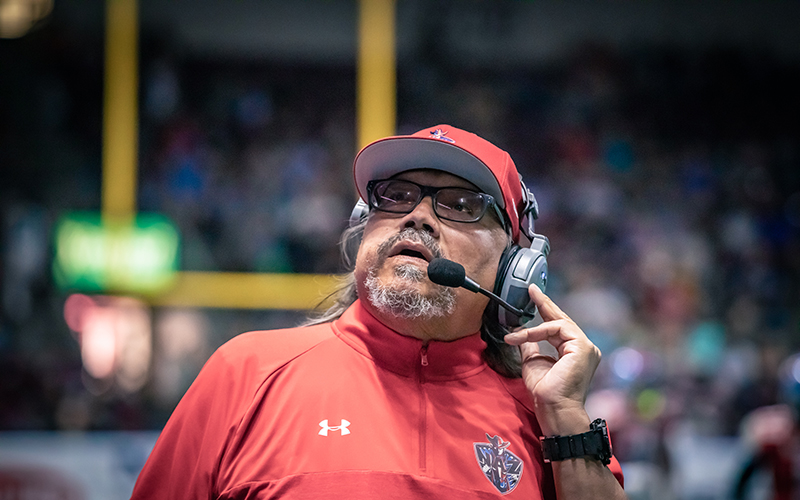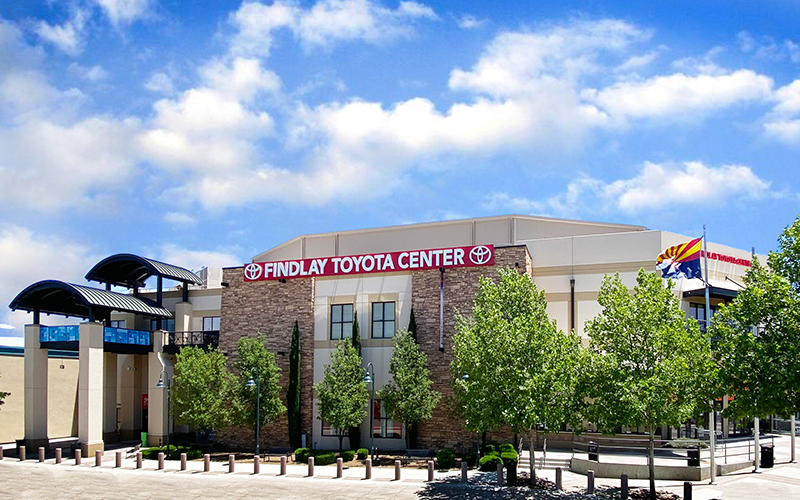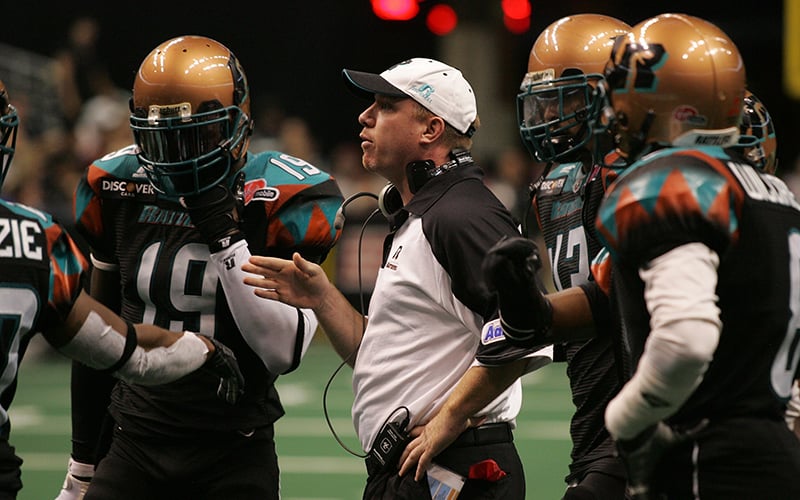
Tim Parker kicks an extra point for the Northern Arizona Wranglers during their opening game against the Arizona Rattlers on May 16. The Rattlers won, 51-20. (Photo courtesy of Blushing Cactus Photography)

The Northern Arizona Wranglers hired Dominic Bramante as head coach after he won two titles in Champions Indoor Football with the Duke City Gladiators in 2018 and 2019. (Photo courtesy of Blushing Cactus Photography)
PHOENIX – The Findlay Toyota Center in Prescott Valley seats about 5,100 spectators for sporting events. For seven months during the pandemic, though, it sat empty – except for the ghosts of dearly departed minor league teams.
Most recently, the Northern Arizona Suns of the NBA G League left the Prescott Valley region for the greener pastures of midtown Detroit, but the wound was still fresh from the loss of the Arizona Sundogs of the late Central Hockey League (CHL), way back in 2014.
Any enterprising owner who wanted to bring a team back to the arena in Prescott Valley would need an understanding of the region’s sports history, and a willingness to connect with the community. Enter Trey Medlock.
“I’m very particular with my needs and wants in (a) market,” Medlock said, “and even with COVID going on, when I found Prescott (and) Prescott Valley, I felt like I could make that one work.”
Medlock is the owner of the brand-new Northern Arizona Wranglers of the Indoor Football League (IFL), a team conceived, marketed and assembled amid COVID-19.
The team was announced in August, to begin playing at Findlay Toyota Center in the spring. Now, they’re starting their season at a time when late-pandemic economic optimism could give them a boost, said the arena’s general manager, Shane Cadwell. Not only that, indoor football occupies a time during the summer when arenas typically lack programming, he said.
“It’s a really good match for our market,” Cadwell said, “in terms of what people are looking for.”
Medlock, a native of Shallowater, Texas, got his start as a college basketball coach before transitioning to the front office with the Lubbock Cotton Kings, in what became the CHL. Then, as an owner, he led a CHL franchise, the Rio Grande Valley Killer Bees, and tried his hand at arena football with the Rio Grande Valley Dorados of the af2. Later, he helped lead minor league teams from Colorado to Oklahoma to Tennessee.
After some encouraging conversations with Kevin Guy – a former coach of Medlock’s in Rio Grande Valley who now coaches the IFL’s Arizona Rattlers and co-owns its Tucson Sugar Skulls – and IFL commissioner Todd Tryon, Medlock decided to join the Indoor Football League in Northern Arizona. It’s part of a broader league expansion into the Southwest that includes teams in Frisco, Texas; Oakland, California; San Diego; and Tucson.

The Findlay Toyota Center has been home to many Prescott Valley sports teams and now hosts the Northern Arizona Wranglers. (Photo courtesy of Findlay Toyota Center)
In the Rattlers and Sugar Skulls, the Wranglers have two local rivals, which helps with both cost savings and fan engagement. At least 100 fans traveled from Phoenix for the season-opening match between the Wranglers and the Rattlers, Medlock said.
“I hope in return, we eventually develop the same fanbase that will travel to Phoenix or travel to Tucson to watch our games,” he added.
After the team made its announcement and secured its lease, it was left with less than a year to build a season-ticket base, secure corporate partnerships and, of course, assemble a roster – all as the pandemic plagued Arizona.
Despite this quick turnaround, Medlock sees the Wranglers as a long-term project with a multi-year timeline. Building trust in the community – “shaking hands” is his shorthand – takes prolonged effort, Medlock said.
“I’m not going to (be able to) meet everybody that owns a business in seven months,” he said.
Especially given the Sundogs’ demise – when the CHL folded and the ECHL (then the East Coast Hockey League) “took the teams they wanted and left everybody else out high and dry,” Medlock said – the Wranglers need to seem authentic to their market.
That’s where Donna Werking comes in. A former Director of Corporate Sales for the Sundogs, Werking now runs her own local agency, Northern AZ Social, which handles the Wranglers’ marketing. She has lived in Prescott since 1995 and hopes the team can connect with the region as her former employer did – using a model she said was based on professionalism and accessibility.
Werking said that before she agreed to market the Wranglers, she wanted to make sure the owners planned to have a house in the area.
“Other teams that I felt did not get it right the first time around … they lacked that component of integrating with our community,” she said.
One big marketing challenge was the season’s uncertain start date. As the IFL gradually delayed the Wranglers’ kickoff from March to May due to COVID-19 concerns, Werking wasn’t certain when football was going to actually take place – an uncertainty she said did not suit her “black-and-white” approach. But ultimately, she said the delay aided the Wranglers considerably.
“And that’s because now people have been vaccinated, people feel safer in a crowd,” she said.
One continued source of instability is the team’s rosterr. Coach Dominic Bramante, who most recently won back-to-back championships with the Duke City Gladiators of Champions Indoor Football (now an IFL rival), brought along his fellow coaches but went in a different direction with his roster.
“We wanted to start a new chapter, a new era,” he said, “so we didn’t recruit any of our players from Albuquerque.”
The pool of available players is large, Medlock said, because “there’s hundreds and hundreds of football players that have played either in the IFL or the NAL (National Arena League) that we were able to call.”
However, after a forced hiatus due to the pandemic, many of the players Wranglers did recruit were unaccustomed to playing football at all, let alone the frenetic, high-scoring indoor game.
“They hadn’t had football movement for almost two years,” Bramante said. “And so, we work at such a frenzied pace, we were popping hammies and groins left and right.”
This early-stage roster tumult hasn’t been ideal for Werking and her agency, who have to determine which players to market to fans. She did cite former University of New Hampshire safety Pop Lacey as a standout player.
It hasn’t quite come together on the field yet for the Wranglers. They lost 51-20 to the Rattlers in Prescott Valley, then 61-39 to the Bismarck Bucks in North Dakota. But Bramante, despite his self-described one-week-at-a-time mentality, is optimistic for the future.
“Next year will be so much more advanced than we were this year… COVID affected us, in a way, more than other teams, because we didn’t have a core,” Bramante said.
And Werking has been in this position before. Her first year with the Sundogs was “a mess.”
“Once we got that year behind us, and under our belt,” she said, “we won the championship the next year.”
For their part, the fans already seem to be enjoying themselves. When Medlock picked the Prescott Valley market, one key aspect he honed in on was the parking lot of the Findlay Toyota Center, where fans would be allowed to tailgate before Wranglers games, and which they’re already utilizing.
And heading into a June 5 home game against the Spokane Shock, the word of mouth is good, Cadwell said, an auspicious sign for the team’s integration into the community of Northern Arizona sports fans.
“They’re thrilled with it,” he said, “and they’re telling their friends and neighbors about it.”

